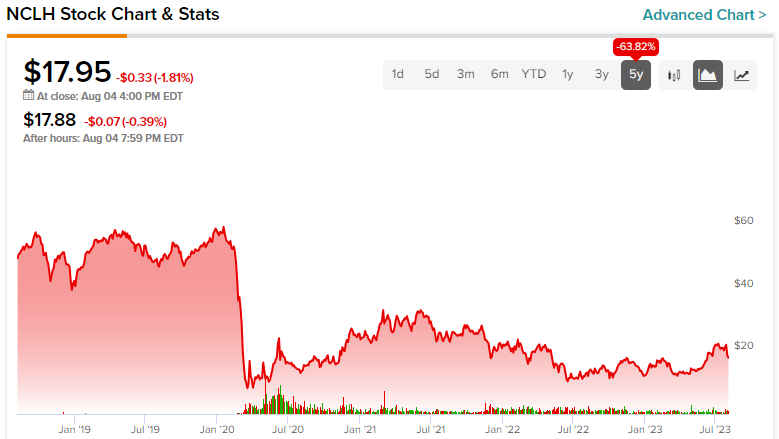Is Norwegian Cruise Line (NCLH) Stock A Smart Hedge Fund Investment?

Table of Contents
NCLH's Financial Performance and Future Projections
Analyzing NCLH's financial health is crucial for any potential investor. This involves examining past performance to predict future prospects and assess the company's ability to weather potential storms.
Revenue and Profitability
NCLH's historical financial performance reveals a pattern of fluctuating revenue and profitability, heavily influenced by seasonal demand and unforeseen events like the COVID-19 pandemic. Examining key financial ratios provides a clearer picture.
- Key Financial Ratios: Analyzing the Price-to-Earnings (P/E) ratio, Return on Equity (ROE), and debt-to-equity ratio against competitors like Royal Caribbean (RCL) and Carnival Corporation (CCL) is crucial for comparative analysis. A lower P/E ratio might suggest undervaluation, while a strong ROE indicates efficient use of shareholder equity. High debt levels, however, pose significant risks.
- Revenue Growth: Examining historical revenue growth trends, alongside projected occupancy rates and future booking data, paints a picture of potential future revenue streams. Industry forecasts and expert opinions can further refine these projections.
- Profitability Margins: Analyzing operating margins and net profit margins helps assess NCLH's efficiency in generating profits relative to its revenue. Fluctuations in these margins can highlight vulnerabilities to external factors like fuel price increases.
Debt Management and Liquidity
A critical aspect of evaluating NCLH's investment potential is its debt management and liquidity position.
- Debt-to-Equity Ratio: A high debt-to-equity ratio indicates a reliance on debt financing, which can be risky during economic downturns. Analyzing this ratio over time helps assess the company's ability to manage its debt load.
- Interest Coverage Ratio: This ratio shows NCLH's ability to meet its interest payments. A low ratio signifies potential financial strain and increased risk of default.
- Cash Flow Analysis: Analyzing NCLH's operating cash flow, investing cash flow, and free cash flow provides insights into its cash generation capabilities and ability to service debt and make strategic investments. Strong positive cash flow indicates financial health.
Market Trends and Industry Outlook for the Cruise Sector
Understanding the broader cruise industry context is critical for assessing NCLH's investment viability.
Post-Pandemic Recovery
The COVID-19 pandemic significantly impacted the cruise industry. Analyzing the speed and strength of the recovery is vital.
- Passenger Numbers: Monitoring passenger numbers, capacity utilization rates, and booking trends provides insights into the recovery's pace and the resurgence of passenger demand.
- Pricing Trends: Analyzing pricing trends reveals consumer sensitivity and the industry's ability to adjust to changing demand. Price increases might signal strong demand, but could also deter price-sensitive travelers.
- Uncertainties: The industry's recovery is still subject to several uncertainties, including potential future outbreaks, economic downturns, and evolving travel regulations.
Competition and Market Share
NCLH operates in a competitive market. Understanding its competitive positioning is crucial.
- Market Share Analysis: Examining NCLH's market share relative to competitors like Carnival and Royal Caribbean reveals its strength and potential vulnerabilities.
- Competitive Advantages: NCLH's unique selling propositions, such as its Freestyle Cruising concept, need to be assessed in relation to its competitors’ offerings.
- Brand Positioning: The success of NCLH's marketing and brand image building efforts directly impacts its ability to attract customers and maintain pricing power.
External Factors and Risks (Fuel Prices, Geopolitical Events)
External factors pose significant risks to the cruise industry.
- Fuel Price Volatility: Fluctuations in fuel prices directly impact operational costs and profitability. Hedging strategies and fuel efficiency improvements can mitigate this risk, but to a limited extent.
- Geopolitical Instability: Geopolitical events, such as wars or political unrest in popular cruise destinations, can significantly disrupt operations and passenger demand.
- Economic Downturns: Economic recessions generally lead to reduced discretionary spending and lower demand for leisure travel, including cruises.
NCLH Stock Valuation and Investment Implications for Hedge Funds
Evaluating NCLH's stock valuation is key to determining its suitability for hedge fund investment.
Stock Price Analysis
A thorough stock price analysis is essential.
- Technical Analysis: Employing technical analysis techniques such as moving averages, support and resistance levels, and chart patterns can help identify potential entry and exit points.
- Fundamental Analysis: Utilizing fundamental analysis, including discounted cash flow (DCF) analysis, helps assess the intrinsic value of NCLH stock and compare it to its current market price.
Hedge Fund Investment Strategies
Various hedge fund strategies might be suitable for NCLH stock, depending on risk tolerance and investment horizon.
- Long-Short Strategies: These strategies involve simultaneously holding long and short positions in related securities to profit from market inefficiencies. This could be employed if the investor sees a divergence between NCLH's price and its underlying value.
- Event-Driven Strategies: These strategies capitalize on specific corporate events, such as mergers and acquisitions or restructuring, which can significantly impact NCLH's stock price.
- Quantitative Strategies: These strategies use complex mathematical models to identify trading opportunities and manage risk.
Conclusion: Is NCLH Stock Right for Your Hedge Fund?
Determining whether NCLH stock is a smart hedge fund investment requires a comprehensive analysis of its financial health, the industry's outlook, and the inherent risks involved. While the post-pandemic recovery presents growth opportunities, considerable uncertainty remains. External factors and the inherent volatility of the cruise industry should be carefully considered. Thorough due diligence, including detailed financial modeling and risk assessment, is paramount. Hedge fund managers should evaluate NCLH's suitability against their specific investment objectives and risk tolerance before making any investment decisions. Further research into NCLH's future strategies, competitive actions and macroeconomic factors influencing the cruise industry is advisable. Consider consulting independent financial advisors and exploring additional resources before investing in Norwegian Cruise Line (NCLH) stock.

Featured Posts
-
 Bkpm Bidik Investasi Rp3 6 Triliun Di Pekanbaru Tahun 2024
May 01, 2025
Bkpm Bidik Investasi Rp3 6 Triliun Di Pekanbaru Tahun 2024
May 01, 2025 -
 Dragons Den Investment Strategies What Works And What Doesnt
May 01, 2025
Dragons Den Investment Strategies What Works And What Doesnt
May 01, 2025 -
 Brtanwy Parlymnt Ka Kshmyr Ke Msyle Ke Hl Ky Khly Hmayt Sdr Azad Kshmyr Ka Byan
May 01, 2025
Brtanwy Parlymnt Ka Kshmyr Ke Msyle Ke Hl Ky Khly Hmayt Sdr Azad Kshmyr Ka Byan
May 01, 2025 -
 Extra Inning Magic Guardians Defeat Royals In Season Opener
May 01, 2025
Extra Inning Magic Guardians Defeat Royals In Season Opener
May 01, 2025 -
 Ftc Commissioners Fight For Reappointment After Dismissal
May 01, 2025
Ftc Commissioners Fight For Reappointment After Dismissal
May 01, 2025
